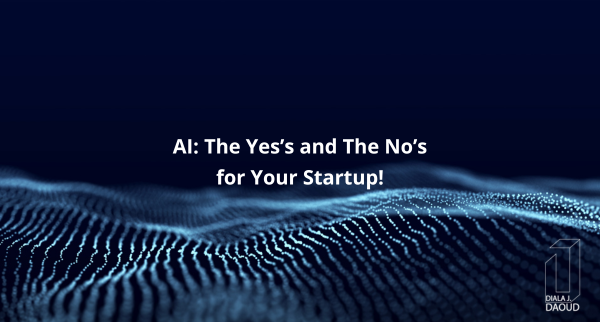In today’s rapidly evolving world of science, technology, and innovation, staying current is not just a choice—it’s a necessity. Being curious, informed, and up-to-date on the latest trends and technologies is crucial. This doesn’t mean blindly adopting every new technology that emerges. It’s about approaching innovation with an open mind, unafraid of new possibilities. This mindset is something I have embraced, not only for my personal growth but also to empower the founders and ecosystems I work with. When it comes to Artificial Intelligence (AI), I have carefully considered what to incorporate into my daily life and what to approach with caution.
Understanding Artificial Intelligence (AI)
Let’s revisit the basics and define Artificial Intelligence (AI), for those unfamiliar with it. According to ChatGPT:
Artificial Intelligence (AI) is a branch of computer science focused on creating systems or machines that can perform tasks typically requiring human intelligence. These tasks include problem-solving, learning, reasoning, understanding natural language, recognizing patterns, and making decisions. AI systems are designed to mimic cognitive functions such as perception, reasoning, learning from experience, and adapting to new situations. Key Components of AI include Machine Learning (ML), Natural Language Processing (NLP), Computer Vision, Robotics, and Expert Systems…. Since its inception in 1956, AI has been applied across various industries, including healthcare, finance, retail, transportation, entertainment, and more.
The Promise of AI in Startups
While I am not a tech expert, my experience has shown me the promising potential of AI. It can optimize day-to-day operations and support the development of advanced tech features in startups. Here are some practical ways one can utilize it with:
- Research Validation and Consolidation: AI can help gather, validate, and consolidate research data.
- Market Trend Monitoring: AI tools can analyze market trends and identify opportunities.
- Customer Service Enhancement: AI can support customer service, particularly outside working hours, in addition to monitoring and analyzing customer behavior and advising the right communications for those.
- Task Automation: AI can automate repetitive tasks such as data entry, scheduling, bookkeeping, and inventory management.
- Forecasting and Analytics: AI can improve forecasting and provide better insights for data-driven decision-making.
- Human Resources: AI can streamline tasks such as resume assessment, talent management, and performance optimization.
- Strategic Planning: AI-driven data analytics can enhance business decisions and strategic planning. According to Entrepreneur.com, “Artificial intelligence is transforming entrepreneurship by enabling deep customer insights and data-driven decision-making at an unprecedented scale.”
- Legal and Compliance Monitoring: AI can track legal matters and ensure compliance with regulations.
- Cybersecurity: AI can detect cybersecurity threats and assess associated risks.
- User Experience Improvement: AI can personalize user experiences by analyzing behavior and tailoring marketing content to them.
- Product Development: AI can enhance product and platform feature development.
The Limitations of AI in Startups
Despite its many advantages, AI falls short in some critical areas of startup management:
- Human-Centered Tasks: I find it frustrating when I’m addressed by a bot, especially when dealing with urgent matters or needing to speak with a human agent. This is a common experience, so be cautious about over-relying on AI in your startup’s marketing and communications.
- Decision-Making: While AI can provide data-driven insights, decision-making should always be empathetic, ethical, and human-centered. AI struggles with crisis management, legal handling, and investment decisions, where human judgment is crucial.
- Leadership: AI can support leadership but cannot replace the human qualities needed to lead a startup to success. You should not consider AI for co-founder or C-suite roles.
- Creativity: Although AI can assist creativity, it cannot drive it. Achieving the desired outcomes from AI often requires creative human input.
- Company Culture: AI cannot replace the human spirit that fosters a healthy, compassionate, and supportive company culture.
- Security Risks: Using AI involves feeding it sensitive company data and access to systems, which can pose significant security risks. The detailed prompts required to make AI effective can also be a vulnerability.
Embracing AI with Cautions
As a lifelong learner, I’m committed to being open to new and emerging technologies—curious to discover, assess, and either adopt or reject them. AI is leading the tech space today, and startups that fail to integrate AI into their operations risk falling behind. However, it’s crucial to recognize and evaluate the associated benefits and risks or every adoption. With AI, there are the yes’s and no’s for your startup!
________
Note: Grammarly proofread this essay, and ChatGPT helped with its research.




